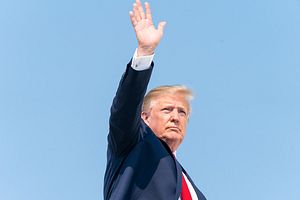On Saturday, U.S. President Donald J. Trump, in a series of tweets, announced that he had canceled an apparent secret meeting with representatives of the Taliban and the Afghan government at Camp David, a Maryland presidential retreat.
“Unbeknownst to almost everyone, the major Taliban leaders and, separately, the President of Afghanistan, were going to secretly meet with me at Camp David on Sunday,” Trump tweeted. “They were coming to the United States tonight.” From the president’s tweets, the now-canceled Camp David meeting appeared to be a U.S. proposal.
“Unfortunately, in order to build false leverage, they admitted to … an attack in Kabul that killed one of our great great soldiers, and 11 other people,” he added, referencing a recent suicide attack in Kabul, the Afghan capital.
“I immediately cancelled the meeting and called off peace negotiations,” Trump continued, questioning whether the Taliban had conducted the attack to strengthen their “bargaining position.”
“If they cannot agree to a ceasefire during these very important peace talks, and would even kill 12 innocent people, then they probably don’t have the power to negotiate a meaningful agreement anyway,” the U.S. president added, concluding by asking how many more “decades” the Taliban would be willing to fight.
The U.S. president’s tweet would appear to upend months of efforts by U.S. Special Representative on Afghanistan Zalmay Khalilzad to clinch a deal with the Taliban, leading to a withdrawal or substantial reduction in the U.S. troop presence in the country.
The announcement that Trump was apparently ready to host members of the Taliban at Camp David also came as a surprise. No such meeting had been reported in any media reports prior to the president’s tweet, suggesting that any plans, if they existed, were successfully kept quiet.
The United States has been at war with the Taliban since the initial invasion of Afghanistan in late-2001, after the September 11, 2001, attacks. A meeting with members of the Taliban, if it had taken place this weekend, would have come days before the 18th anniversary of those attacks this month.
It’s unclear how Trump’s Saturday announcement will be received by the Afghan government, which has already been deeply skeptical over the U.S. effort to come to an agreement with the Taliban.
Trump’s announcement follows a trip to Qatar by Khalilzad at the end of last week. Khalilzad had said that the two sides had apparently agreed to a deal, but rushed back to Doha after the Thursday attack in Afghanistan. “We hope to have good news soon for our Muslim, independence-seeking nation,” a Taliban spokesperson told Reuters last week.
According to Khalilzad, the contours of the existing deal would see 5,400 U.S. troops withdrawn from Afghanistan on a compressed timeline, after which an additional 8,600 would remain. Those troops would then leave Afghanistan over a longer period.
































